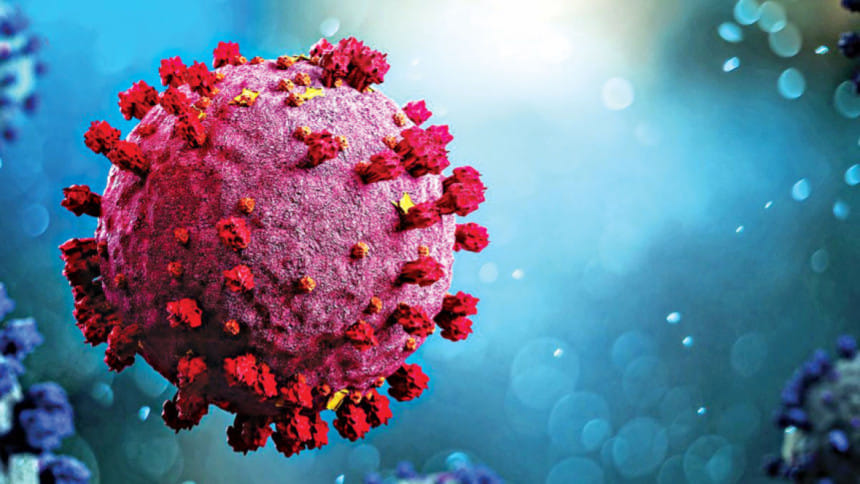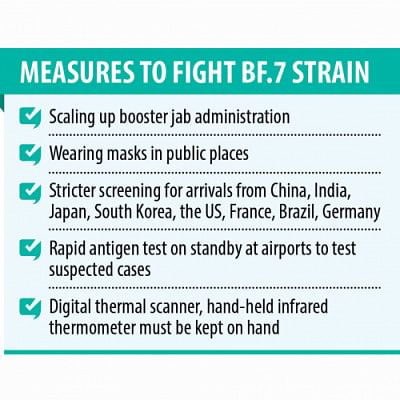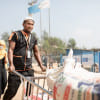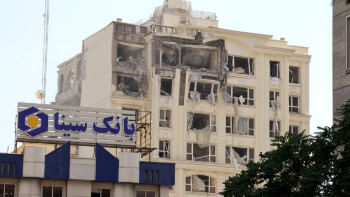Guards up as new Omicron strain looms


The new coronavirus subvariant that is ripping through China has compelled the government to step up guard.
Health officials are urging people to take caution including taking booster jabs and wearing masks in crowded areas, while the Directorate General of Health Services has instructed the officials concerned to strengthen screening at all entry points.
The hospitals have been instructed to be on standby in case of a fresh surge.
The new subvariant of Omicron, the BF.7, is said to be much more transmissible than earlier coronavirus strains, has more immune escape capability and a shorter incubation period.
China is witnessing a surge in infections and deaths after the government abandoned its "zero Covid" strategy two weeks ago in face of protests against the draconian controls. On Friday, the country reported 28,493 cases and 76 deaths, according to the World Health Organisation.
The BF.7 strain of the Omicron variant has also been detected in India, prompting the authorities to put in place preventive measures.
In light of the situation, the National Technical Advisory Committee (NTAC) sat on Saturday and came up with a set of recommendations including accelerating the government's campaign for booster doses and ensuring everyone maintains personal protective measures.
The reproduction number of the BF.7 subvariant is 18, while the previous subvariant BA.5 had only 4, said Ahmedul Kabir, additional director general (administration) of DGHS.
"It means the new variant has four times higher transmissibility. More importantly, the incubation period is shorter, enabling it to infect many people at a time," he said in a virtual briefing yesterday.
The BF.7 infection poses symptoms similar to other Omicron variants, he said. The common symptoms of the previous subvariant include fever, sore throat, runny nose and cough.
So, taking a booster and wearing masks is a must to stay safe, he added.
"It is a reality worldwide that people have forgotten the practice of maintaining health and safety rules," said Mohammad Shahidullah, president of NTAC, in the briefing.
People's response to taking booster jabs was not good at all, he said.
Asked whether there will be any travel restrictions for incoming passengers from countries with the latest spike, Kabir said: "It's a decision that will come from the government higher-ups."
Bangladesh has been reporting a "steady decline" in Covid-19 cases, with no death reported since December 18 except for one fatality yesterday.
The number of new cases has remained below 10 and the positivity rate is near zero in the previous three days until yesterday.
Experts warned the new variant may cause a fresh surge in cases at any time.
If someone is experiencing such symptoms, they should go for a test immediately as early detection and isolation are extremely crucial to preventing the disease from spreading, said Mushtuq Hussain, consultant at the Institute of Epidemiology, Disease Control and Research (IEDCR).
Stressing on ensuring health and safety rules at the hospitals, he said: "People will go to the hospitals when they will fall sick. Therefore, it is urgent to control virus infection at the hospital."
HOSPITALS AND PORTS ON ALERT
The health directorate already instructed all hospitals in the country to prepare Covid-19 isolation wards, Kabir said.
"The DNCC Covid-19 Hospital has also been kept ready to receive patients."
As of yesterday, around 99.7 percent of the hospital beds out of 12,860 for Covid patients were vacant. Only 17 out of 1,186 ICU beds for Covid-19 patients were occupied.
A notice was sent to all the ports in 14 districts on Saturday asking the authorities to ensure rigorous screening of all incoming passengers.
"The screening process has to be strengthened for the suspected international passengers from China, India, Japan, South Korea, the US, France, Brazil, Germany and other countries so that this virus cannot enter the country through them," it said.
It also asked the officials to arrange a rapid antigen test for those passengers with Covid-19 symptoms.
The DGHS has instructed them to keep the digital thermal scanner and hand-held infrared thermometer operational.
In addition to this, the DGHS has also instructed the IEDCR to conduct genome sequencing of the infected patients' samples to track the new variant.

 For all latest news, follow The Daily Star's Google News channel.
For all latest news, follow The Daily Star's Google News channel. 








Comments